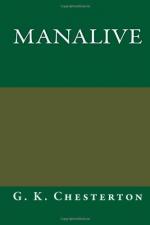“So far as this first charge of continual attempted murder is concerned,” said Dr. Pym, standing up for the last time, “that is my case.”
Michael Moon rose for the defence with an air of depression which gave little hope at the outset to the sympathizers with the prisoner. He did not, he said, propose to follow the doctor into the abstract questions. “I do not know enough to be an agnostic,” he said, rather wearily, “and I can only master the known and admitted elements in such controversies. As for science and religion, the known and admitted facts are plain enough. All that the parsons say is unproved. All that the doctors say is disproved. That’s the only difference between science and religion there’s ever been, or will be. Yet these new discoveries touch me, somehow,” he said, looking down sorrowfully at his boots. “They remind me of a dear old great-aunt of mine who used to enjoy them in her youth. It brings tears to my eyes. I can see the old bucket by the garden fence and the line of shimmering poplars behind—”
“Hi! here, stop the ’bus a bit,” cried Mr. Moses Gould, rising in a sort of perspiration. “We want to give the defence a fair run—like gents, you know; but any gent would draw the line at shimmering poplars.”
“Well, hang it all,” said Moon, in an injured manner, “if Dr. Pym may have an old friend with ferrets, why mayn’t I have an old aunt with poplars?”
“I am sure,” said Mrs. Duke, bridling, with something almost like a shaky authority, “Mr. Moon may have what aunts he likes.”
“Why, as to liking her,” began Moon, “I—but perhaps, as you say, she is scarcely the core of the question. I repeat that I do not mean to follow the abstract speculations. For, indeed, my answer to Dr. Pym is simple and severely concrete. Dr. Pym has only treated one side of the psychology of murder. If it is true that there is a kind of man who has a natural tendency to murder, is it not equally true”—here he lowered his voice and spoke with a crushing quietude and earnestness—“is it not equally true that there is a kind of man who has a natural tendency to get murdered? Is it not at least a hypothesis holding the field that Dr. Warner is such a man? I do not speak without the book, any more than my learned friend. The whole matter is expounded in Dr. Moonenschein’s monumental work, `The Destructible Doctor,’ with diagrams, showing the various ways in which such a person as Dr. Warner may be resolved into his elements. In the light of these facts—”
“Hi, stop the ’bus! stop the ’bus!” cried Moses, jumping up and down and gesticulating in great excitement. “My principal’s got something to say! My principal wants to do a bit of talkin’.”
Dr. Pym was indeed on his feet, looking pallid and rather vicious. “I have strictly con-fined myself,” he said nasally, “to books to which immediate reference can be made. I have Sonnenschein’s `Destructive Type’ here on the table, if the defence wish to see it. Where is this wonderful work on Destructability Mr. Moon is talking about? Does it exist? Can he produce it?”




